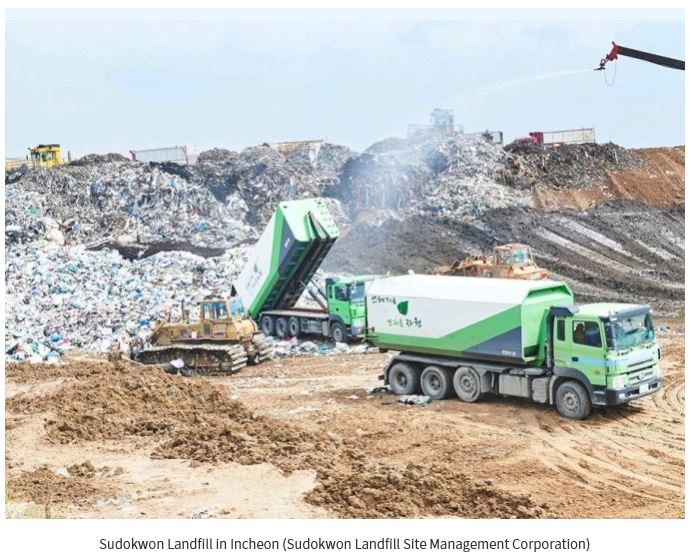
A conflict over landfills has arisen with Incheon refusing to receive garbage from Seoul and Gyeonggi Province beginning in 2025. Experts say Seoul and Gyeonggi Province should look to reducing garbage to better persuade Incheon.
Sudokwon Landfill in Incheon has been taking waste from the metropolitan area since 1992. The first and second parts of the landfills were used between 1992 and 2018. The initial phase of the third part, or 3-1 landfill, is being used between 2018 and 2025 by Seoul, Incheon and Gyeonggi Province.
Although there is land available for the second and third phase of the third part, or 3-2 and 3-3, and a fourth part of the landfill, Incheon declared last year that it would no longer bring in garbage from Seoul and Gyeonggi Province after 2025, when the contract for the 3-1 landfill ends.
The 1.03 million square meters of the 3-1 landfill collects waste generated by 64 local governments in the metropolitan area. It takes care of 14,000 tons of waste every day. Around 48 percent of the garbage comes from Seoul, 33 percent from Gyeonggi Province and 19 percent from Incheon.
According to the Seoul Metropolitan Government, 34 percent of the 3-1 landfill has been used as of the end of last year and it can be used until 2027, two years after the contract deadline.
However, if Incheon refuses to allow it, Seoul and Gyeonggi Province need to immediately find alternatives.
Upon Incheon’s opposition, Seoul and Gyeonggi Province, along with the Ministry of Environment, have looked for alternative landfills since January with pledges of trillions of won in subsidies. The deadline is Wednesday but no regional government has applied.
The newly elected mayor Oh Se-hoon is seeking to extend the current landfill agreement in consultation with Incheon.
During the Seoul mayoral candidate debate last month, he said, “The landfill has been well operated in Incheon, but the situation has become very urgent as the Incheon Metropolitan Government has expressed reluctance.”
“[Talks] must begin immediately so that the landfill in Incheon can be used continuously,” he added.
He also said in an interview with local media outlet Environment Daily last week, “The construction of (new) landfill is difficult because it is a facility people avoid so we will actively pursue policies to extend the current period of use of the landfill.”
However, the mayor of Incheon thinks differently.
Incheon Mayor Park Nam-choon responded to Oh’s remarks by saying, “Don’t use Incheon, which has been suffering for more than 30 years, as a scapegoat anymore.”
Park also reaffirmed his position at a press conference last week, saying, “We cannot accept the extension.”
Incheon’s resident committee, who has been calling for an end to the landfill, also plans to launch a campaign to collect the signatures of one million citizens.
Baek Jin-ki, chairperson of the committee, said the Incheon Metropolitan City government and the Incheon Metropolitan City Council should do their best to end the landfills and create an eco-friendly landfill.
Despite the continued struggle for landfills, the amount of garbage being produced is on the rise due to changes in consumption patterns that generate more packaging waste.
According to data released earlier this month by the government, transactions in the transportation service sector, which includes delivery service and food delivery, rose 23.7 percent year-on-year to about 35.3 trillion won ($31.5 billion) last year.
Experts and environmental groups say that since finding alternative landfills is not realistically easy, Seoul’s efforts to reduce waste are essential before persuading Incheon. They say Seoul’s attitude to solve it only with money is hurting Incheon’s pride.
“Finding a new landfill is not an easy task. In order to prevent a garbage crisis, we need to secure disposal facilities and at the same time pay attention to reducing waste generation itself,” said Lee Nam-hoon, a professor in the department of environmental energy engineering at Anyang University.
“It is important to manage waste that has already been made, but it is more efficient to prevent waste from being created in the first place,” he said.
Hong Soo-yeol, manager at Resource Recycling Consulting, said, “The issue is turning into a regional emotional problem. Under current conditions, it is difficult for (Seoul and Gyeonggi Province) to persuade Incheon to continue to extend the use. Each local government should make efforts to reduce waste.”
“Reducing waste from individuals cannot be done in a short period of time. So the amount of standard plastic garbage bags to landfills should be reduced by, for instance, pre-treatment,” he said.
Pre-treatment means filtering out what is recyclable before dumping it into landfills.
“If we take out only the vinyl plastic in the standard plastic garbage bags, the amount of trash will be reduced by half and we can use an incinerator twice,” Hong said.
Environment civic group Korean Federation for Environmental Movement said local governments should restrict the use of disposable products and packaging waste, encourage multi-use of products and open Zero-Waste stores to encourage less waste from producers.
By Shin Ji-hye (shinjh@heraldcorp.com)
http://www.koreaherald.com/view.php?ud=20210414000906&np=1&mp=1